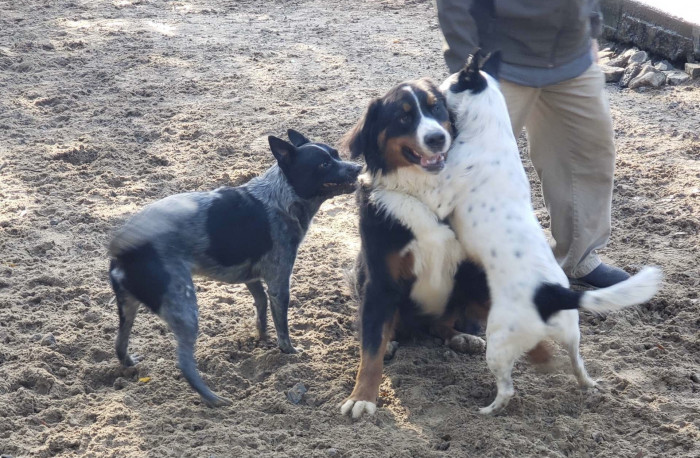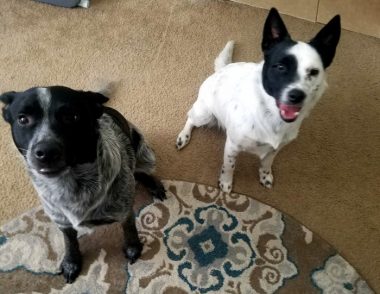My Blue Heelers Provided the Healing From Trauma That I Needed
Written by |

There are many therapeutic approaches to healing from trauma. Because everyone’s healing process is different, I don’t believe one technique is better than another.
During my post-surgery season, my wife was a little concerned because she was returning to work and I would be home alone at times. My mood was noticeably different and I wasn’t motivated to do much around the house. She wanted me to return to the normal flow of life and not just make it through each day.
We ended up receiving a blessing from one of her work colleagues who had a litter of Australian cattle dogs, also known as blue heelers. Out of this litter we received Raider. From the first day that we had him, he made me work out — not just my body but my mind as well. Six months later, we adopted his brother Creed into our family. Little did I know how much they were helping me heal inside and out.

Raider on the left and Creed on the right. (Courtesy of Paris Dancy)
These days, I can look back and see the lessons I learned from caring for them and how those lessons correlated with my healing trajectory.
Learning patience is a must
Raising puppies requires a lot of forbearance! Even though a tumor caused my Cushing’s, my symptoms and physical changes did not happen overnight. My mind and body went through a traumatic event, and I needed to rebuild both of them through a lengthy course of treatments. Although we are taught the opposite, time was my friend in this case. Patience is necessary in the slow process of healing from trauma.
More consistency in my decisions
Heelers need structure, and I knew I needed to improve my ability to provide this. Consistency can be a good or bad thing, depending on your intentions. My lack of good decision-making was hurting everyone around me, so I worked hard to become more conscious of my choices. By making more consistent decisions, I began to form more secure attachments and stay more accountable, which supported my healing.
Protectiveness … from myself
This characteristic in the blue heeler breed can be mistaken for aggression. My boys have great instincts to detect any type of threat that approaches within a certain distance. I needed to adapt this same mentality to protect myself from myself. What exactly does this mean? Doubt, fear, low self-esteem, and negative talk and thoughts could no longer be a part of me. Whenever they started to intrude into my mind, I would immediately fight those illusions with the truth. The truth is that I was dealing with uncomfortable change, but I would emerge from this season even better than I was before.
Learning wisdom from my furry teachers
While out with my boys, almost everyone responds the same way: “They are a very smart breed.” I completely agree that they are smart, but the fact that they also apply their knowledge and understanding shows how wise they are. In the same way, I must utilize every bit of knowledge I’ve picked up in my years on this earth to fight one of the most intimidating foes I’ve ever faced. Trauma is a deceptive beast, and fighting its lies takes all the wisdom I have.
Although building these skills didn’t immediately heal me from my trauma, the lessons I’ve learned from caring for my blue heelers have drastically improved my trauma management. These two dogs will never know how important they’ve been in my healing. I am grateful for them.
Until next time, stay positive and motivated, and keep thriving.

Creed. (Courtesy of Paris Dancy)
***
Note: Cushing’s Disease News is strictly a news and information website about the disease. It does not provide medical advice, diagnosis, or treatment. This content is not intended to be a substitute for professional medical advice, diagnosis, or treatment. Always seek the advice of your physician or other qualified health provider with any questions you may have regarding a medical condition. Never disregard professional medical advice or delay in seeking it because of something you have read on this website. The opinions expressed in this column are not those of Cushing’s Disease News or its parent company, Bionews, and are intended to spark discussion about issues pertaining to Cushing’s.






Leave a comment
Fill in the required fields to post. Your email address will not be published.